 | |
| Genre | Role-playing game |
|---|---|
| Publisher | Wizards of the Coast |
Publication date | 2010 |
| Media type | |
| ISBN | 978-0786955602 |
Psionic Power is a supplement to the 4th edition of the Dungeons & Dragons role-playing game.
 | |
| Genre | Role-playing game |
|---|---|
| Publisher | Wizards of the Coast |
Publication date | 2010 |
| Media type | |
| ISBN | 978-0786955602 |
Psionic Power is a supplement to the 4th edition of the Dungeons & Dragons role-playing game.
Psionic Power adds new options for ardents, battleminds, monks, and psions. Supplementing the Player's Handbook 3 is Psionic Power, a D&D supplement that explores the psionic power source in more detail. This supplement presents hundreds of new options for D&D characters, specifically focusing on heroes who channel the power of the mind. It provides new builds for the ardent, battlemind, monk, and psion classes, including new character powers, feats, paragon paths, and epic destinies.
Psionic Power was written by Ari Marmell, Stephen Radney-MacFarland, Peter Schaefer, Stephen Schubert, Robert J. Schwalb, and published in 2010. The book features art by Ralph Beisner, Eric Belisle, Steven Belledin, Kerem Beyit, Leon Cortez, Thomas Denmark, Wayne England, Kate Irwin, McLean Kendree, Roberto Marchesi, Sean V. Murray, William O'Connor, Héctor Ortiz, Lucio Parrillo, Mike Schley, Chris Seaman, Keven Smith, John Stanko, Emi Tanji, Matias Tapia, and Ben Wootten.
Shannon Appelcline commented that the first product line for Fourth Edition Dungeons & Dragons was "a set of 'power' books, beginning with Martial Power (2008), which offered new options for players, organised by the new power sources of D&D. Primal Power (2009) and Psionic Power (2010) would focus on new power sources, after each had been introduced in the Player’s Handbook published earlier the same year." [1] : 300
Viktor Coble listed the entire Power series - including Martial Power , Martial Power 2 , Divine Power , Arcane Power , Psionic Power, and Primal Power - as #2 on CBR 's 2021 "D&D: 10 Best Supplemental Handbooks" list, stating that "What sets the power series apart – besides their updated rules – is how they translate really well to 5e. Whereas, the "Complete" series needs a little more work. The rules have both been pared down and expanded upon in this guide, which makes picking up a copy for whatever type of character is most in favor worth it." [2]
In the Dungeons & Dragons fantasy role-playing game, psionics are a form of supernatural power similar to, but distinct from, arcane and divine magic. Psionics are manifested purely by mental discipline. Psionics were introduced in the original supplement Eldritch Wizardry. Psionics have appeared as part of the core rules beginning with Advanced Dungeons & Dragons 1st edition.
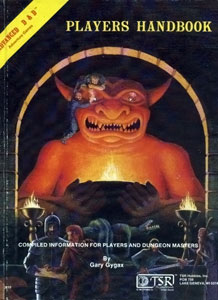
The Player's Handbook is the name given to one of the core rulebooks in every edition of the fantasy role-playing game Dungeons & Dragons (D&D). It does not contain the complete set of rules for the game, and only includes rules for use by players of the game. Additional rules, for use by Dungeon Masters (DMs), who referee the game, can be found in the Dungeon Master's Guide. Many optional rules, such as those governing extremely high-level players, and some of the more obscure spells, are found in other sources.
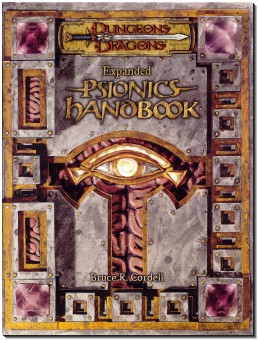
The Expanded Psionics Handbook is a sourcebook written by Bruce Cordell for the 3.5 edition of the Dungeons & Dragons fantasy roleplaying game that contains rules and options for integrating psychic powers into the game. Along with its predecessor, the Psionics Handbook, the Expanded Psionics Handbook expands and adapts the psionics concept with a new emphasis on balance and playability.
The magic in Dungeons & Dragons consists of the spells and magic systems used in the settings of the role-playing game Dungeons & Dragons (D&D). D&D defined the genre of fantasy role-playing games, and remains the most popular table-top version. Many of the original concepts have become widely used in the role-playing community across many different fictional worlds, as well as across all manner of popular media including books, board games, video games, and films.

The Epic Level Handbook is a rule-book by Wizards of the Coast for the 3rd edition of Dungeons & Dragons. The book was published in July 2002, and contains optional game rules for playing characters who have reached a higher experience level than is covered in the standard rules. This is referred to in the book as "epic level" play.

Complete Adventurer is a supplemental hard-cover rulebook for the 3.5 edition of the Dungeons & Dragons game system published by Wizards of the Coast.

Complete Divine is a supplemental rulebook for the 3.5 edition of the Dungeons & Dragons fantasy role-playing game published by Wizards of the Coast. It replaces and expands upon earlier rulebooks entitled Masters of the Wild and Defenders of the Faith, as well as being a catchall for anything that does not fit into Complete Adventurer, Complete Arcane, Complete Warrior, or Complete Psionic.
A character class is a fundamental part of the identity and nature of characters in the Dungeons & Dragons role-playing game. A character's capabilities, strengths, and weaknesses are largely defined by their class; choosing a class is one of the first steps a player takes to create a Dungeons & Dragons player character. A character's class affects a character's available skills and abilities. A well-rounded party of characters requires a variety of abilities offered by the classes found within the game.
The monk is a playable character class in most editions of the Dungeons & Dragons fantasy role-playing game. A D&D monk is a fantasy martial artist, specializing in unarmed combat.
The warlock is a character class in the Dungeons & Dragons fantasy role-playing game. It was introduced as a non-core base class who practice arcane magic in the supplemental book Complete Arcane for the 3.5 edition of Dungeons & Dragons. In 4th and 5th edition, the warlock is a core class.

Complete Psionic is a supplemental rulebook for the 3.5 edition of the Dungeons & Dragons role-playing game published by Wizards of the Coast and released in April 2006. It is the first 3.5 edition supplemental rulebook published by Wizards of the Coast which focuses on psionics since the Expanded Psionics Handbook.

Complete Mage is a supplemental rule book for the 3.5 edition of the Dungeons & Dragons role-playing game. It is effectively the sequel to Complete Arcane.
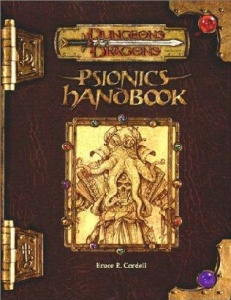
The Psionics Handbook is a sourcebook published by Wizards of the Coast in 2001 for the 3rd edition of the Dungeons & Dragons fantasy role-playing game. It contains a multitude of rules and options for integrating psionic powers into the D&D game.
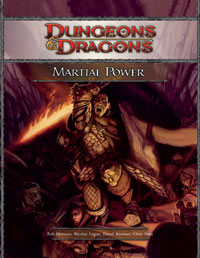
Martial Power is a supplement for the 4th edition of the Dungeons & Dragons fantasy role-playing game. It contains additional options and rules for fighters, rangers, rogues, and warlords, including new builds for each class to further customize a character, such as the "beastmaster ranger," "bravura warlord," and "resourceful warlord".

Dark Sun is an original Dungeons & Dragons (D&D) campaign setting set in the fictional, post-apocalyptic desert world of Athas. Dark Sun featured an innovative metaplot, influential art work, dark themes, and a genre-bending take on traditional fantasy role-playing. The product line began with the original Dark Sun Boxed Set released for D&D's 2nd edition in 1991, originally ran until 1996, and was one of TSR's most successful releases.
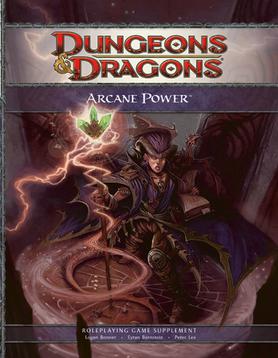
Arcane Power is a supplement for the 4th edition of the Dungeons & Dragons fantasy role-playing game.

Divine Power is a supplement for the 4th edition of the Dungeons & Dragons fantasy role-playing game.

Primal Power is a supplement to the 4th edition of the Dungeons & Dragons role-playing game.

Player's Handbook 3 is a supplement to the 4th edition of the Dungeons & Dragons role-playing game.

Martial Power 2 is a supplement published by Wizards of the Coast (WotC) in 2010 for the 4th edition of the Dungeons & Dragons fantasy role-playing game. The book is a sequel to 2008's Martial Power; like its predecessor, Martial Power 2 provides new options for four specific character classes, as well as some general martial variants.